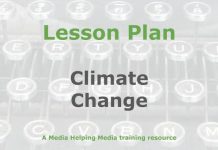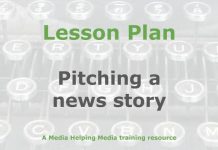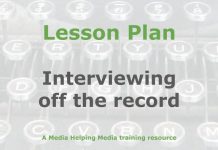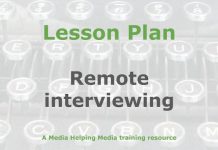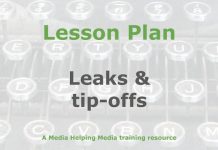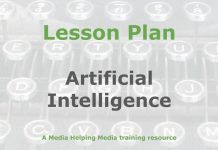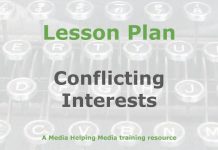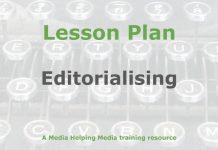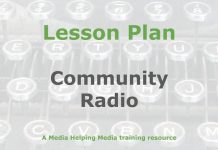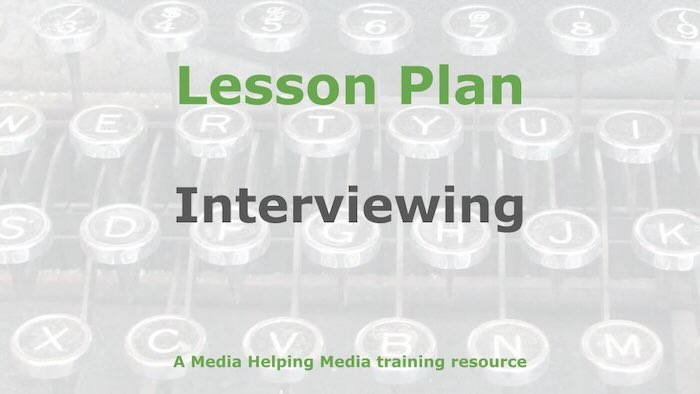 This day-long lesson plan is designed to equip students with the knowledge, skills, and ethical framework necessary to become a confident and competent interviewer.
This day-long lesson plan is designed to equip students with the knowledge, skills, and ethical framework necessary to become a confident and competent interviewer.
It’s based on the article ‘Introduction to interviews’‘ which is published on Media Helping Media. We recommend trainers read the piece before adapting this lesson plan for your own purposes.
Introduction
Interviewing is at the very heart of journalism. Whether you are gathering facts, seeking expert opinions, or capturing the personal stories of those affected by events, your ability to conduct effective interviews will determine the quality and credibility of your reporting.
During this lesson students will explore different types of interviews, develop practical questioning techniques, and practise the art of listening – all while upholding the highest standards of journalistic integrity.
Session 1: Introduction to interviewing (09:00–10:00)
- Aims:
- Grasp why interviewing is fundamental to journalism.
- Discuss the dual purpose of interviews: information gathering and source development.
- Activities:
- Presentation: “Why are interviews a cornerstone of journalism?”
- Activity: Pair students to share experiences of being interviewed or interviewing others.
- Discussion: Get the group to list the qualities of a good interviewer.
Session 2: Types of interviews (10:00–11:00)
- Aims:
- Identify and distinguish between the main types of interviews.
- Become clear on the types of interviews breaking news, adversarial, elucidatory, sensitive, collaborative, celebrity, promotional, vox pop, email, hostile.
- Understand why and when the different styles should be used.
- Activities:
- Task: Assign groups a type of interview to research and present back on:
- Main objectives of the interview
- Challenges and opportunities
- Example questions asked and reasons why
- Class discussion: When might each type be used?
- Task: Assign groups a type of interview to research and present back on:
Break – (11:00-11:15)
Session 3: Essentials & ethics of interviewing (11:15–12:45)
- Aims:
- Understand the core principles underpinning every interview: accuracy, impartiality, fairness, research, attentive listening, professionalism.
- Resource: Ensure students read ‘Why editorial ethics are important’.
- Understand the core principles underpinning every interview: accuracy, impartiality, fairness, research, attentive listening, professionalism.
- Activities:
- Case study: Analyse a published interview for ethical strengths and weaknesses.
- Scenario exercise: How would you handle a sensitive or hostile interview?
- Resource: Ensure students read: ‘Interviewing with integrity scenario’.
- Discussion: Handling sensitive or hostile interviews.
Lunch (12:45–13:45)
Session 4: Preparation & crafting questions (13:45–15:00)
- Aims:
- Learn how to prepare for interviews and craft effective, concise questions.
- Activities:
- Workshop: Research a public figure and write five questions for a hypothetical interview.
- Peer review: Swap and critique questions.
- Instructor feedback: What makes a question effective?
Break (15:00-15:15)
Session 5: Listening & adaptive interviewing (15:15–16:15)
- Aims:
- Practise active listening and adapting to the flow of conversation.
- Activities:
- Role-play: Mock interviews in small groups (interviewer, interviewee, observer).
- Feedback: Observers give feedback on listening skills and adaptability.
- Whole group debrief: What did you learn about listening?
Session 6: Interview lab – practical application (16:15–17:00)
- Aims:
- Apply skills in a simulated, supportive environment.
- Activities:
- Interviewing: Each student conducts a short interview (type assigned at random).
- Group feedback: Focus on ethics, questioning, and listening.
Session 7: Reflection & next steps (17:00–17:30)
- Aims:
- Consolidate learning and plan for future development.
- Activities:
- Written reflection: “What interviewing skill will you focus on next?”
- Group discussion: How can you continue to improve as an interviewer?
Materials needed:
- Handouts summarising interview types and essentials.
- Example interview transcripts.
- Research resources (internet or printouts).
- Recording devices (optional, for mock interviews).
Assessment:
- Participation in discussions and activities.
- Quality of drafted questions and peer feedback.
- Performance in mock interviews and reflection.
Summary
By the end of this intensive day, students will have gained a thorough understanding of the different types of interviews and the essential skills required to conduct them effectively. They will have practised preparing, questioning, and listening, while also grappling with the ethical challenges that journalists face. Most importantly, they will leave with a toolkit of techniques and a commitment to accuracy, impartiality, and fairness – qualities that define trustworthy journalism.
